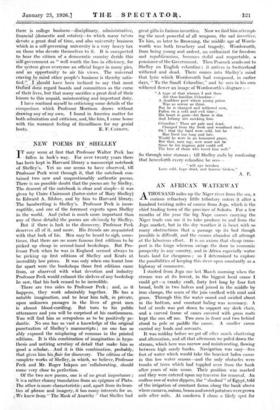NEW POEMS BY SHELLEY
TT may seem at first that Professor Walter Peck has fallen in luck's way. For over twenty years there has heel kept in Harvard library a manuscript notebook of Shelley's. Yet no one seems to have observed, till Professor Peek went through it, that the notebook con- tained two new and unquestionably authentic poems. There is no possible doubt that the poems are by Shelley. The descent •of the notebook is clear and simple—it was given by Claire Clairmont (foster-sister of Mary Shelley) to Edward A. Silsbee, and by him to Harvard library. The handwriting is Shelley's. Professor Peck is incor- ruptible, and one of the foremost experts upon Shelley in the world. And (what is much more important than any of these details) the poems are obviously by Shelley.
But if there is luck in the discovery, Professor Peck deserves all of it, and more. His friends are acquainted with that luck of his. Men may be heard to sigh, some- times, that there are no more famous first editions to be picked up cheap in second-hand bookshops. But Pro- fessor Peck when he was in England seemed always to be picking up first editions of Shelley and Keats at incredibly low prices. It was only when one learnt how far apart were the bookshops those first editions came from, or observed with what devotion and industry Professor Peck would exhaust the shelves of any bookshop he saw, that his luck ceased to be incredible.
'There are two sides to Professor Peck ; and, as it happens, they work admirably together. He has a notable imagination, and to hear him talk, in private, upon unknown passages in the lives of great men is almost blood-curdling. But turn to his public utterances and you will be surprised at his cautiousness. You will find him so scrupulous as to be positively pe- dantic. No one has so vast a knowledge of the original punctuation of Shelley's manuscripts ; no one -has so ably exposed the misplacing of commas in the printed editions. It is this combination of imagination in hypo- thesis and untiring scrutiny of detail that make him so good a scholar.: And it is this combination, probably, that gives him his flair for discovery. The edition of the . complete works of Shelley, in which, we believe, Professor Peck and Mr. Roger Inkpen are 'collaborating, should come very close to perfection.
.0f the two new poems, one is of no great importance ; . it is a rather clumsy translation from an- epigram- of Plato. - The other .is more characteristic ; and, apart from its beau- ties .of-phrase and imagery, it has many-interests for us. We knew' from. " The Mask of Anarchy" that Shelley had great gifts in furious invective. Now we find him attempt. ing the most powerful of all weapons, the sad invective. To him, as later to Browning, the middle age of Words- worth was both treachery and tragedy. Wordsworth, from being young. and ardent, an enthusiast for freedom and republicanism, becomes stolid and respectable, a pensioner of the Government. Then Peacock sends out to Shelley an English celandine ; it .arrives in Switzerland withered and dead.. There comes into Shelley's mind that lyric which Wordsworth had composed, in earlier days, " To the, Small. Celandine," and he sees in his own withered flower an image of Wordsworth's disgrace . " A type of that whence. I and thou
Are thus familiar, Celandine- A deathless poet' whoSe young prime Was as serene, as thine.
But he is changed and withered now, Fallen on a cold and evil time ' •
His heart is gone—his flame is dim
And Infamy sits mocking him.
Celandlne ! Thou art pale, and dead, . . Changed from thy fresh and woodland stai.r. Oh !. that thy. bard -were cold, but he • - Has lived too long and late. Would he were in an honoured grave, But that, men say,' now must not be Since he for impious gold could sell The love of those who loved hiM well." , .
So through nine stanzas,; till Shelley suds by confessing that henceforth every celandine he sees--7 . .
" will aye betoken; Love -sold, hope. dead, and honour broken." A.










































 Previous page
Previous page